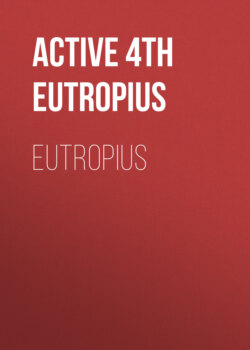Читать книгу Eutropius - active 4th century Eutropius - Страница 3
На сайте Литреса книга снята с продажи.
ОглавлениеPREFACE
Table of Contents
The Breviarium of Eutropius has for many years been used successfully in German schools, but, though an American edition was published in the early part of this century, the author has of late years received little attention in this country. Yet in character and subject the Breviarium is admirably adapted for elementary work. While the Viri Romae deals only with the early history of Rome and the lives of a few great men of the republican age, the Breviarium gives an outline of the history of Rome from the founding of the city to the death of the Emperor Jovian in 364 A.D., and is thus in subject closely related to the Latin course. The Latin is good, remarkably so for the time of its composition, and is not so difficult as that of Nepos or of parts of the Viri Romae.
In editing the text the beginner has constantly been had in mind, and so references to the standard Latin Grammars have been added more copiously than some will consider judicious. It has been found, however, by experience in the classroom, that a reference to the grammar when carefully studied is worth far more than a translation of a difficult passage or comment upon it. The grammatical references are placed at the bottom of the page where they belong. In the Notes, which are principally historical and geographical, the editor has tried to aid the student in mastering the difficulties that occur rather than to do his work for him. The references to the histories are intended rather for the teacher than for the pupil. If a few minutes can be spent every day in reading to the class the portions referred to, the time will not be wasted, and it will fill in the outline of the history that the text contains. It is strongly urged that each student should be provided with a copy of some good outline of Roman History (Creighton’s Primer is admirable), and follow the text in it from day to day. In this way a knowledge of the principal facts of Roman History may be obtained with but slight conscious effort on the part of the student.
In the analyses of the books and the chapters the accepted dates have been given, indicating where Eutropius is mistaken in his chronology. In marking the quantities of the long vowels, Lewis, in his Elementary Latin Dictionary, has been followed, except where later authorities differ from him.
The editor desires to acknowledge his obligation to Rev. J. R. Wilson, D.D., Principal of Portland Academy, for advice and assistance, and to Professors Arrowsmith and Whicher, for permission to use material from their First Latin Readings.
The Grammars cited are Harkness’ Standard Latin Grammar (H.), Mooney (M.), Allen and Greenough (A. & G.), Gildersleeve (G.), and Bennett (B.). References to Harkness’ new Latin Grammars (1898) will be found on p. 242.
J. C. H.
Portland, Oregon,
June, 1898.
EUTROPĪ
BREVIĀRIĪ AB URBE CONDITĀ
Table of Contents
